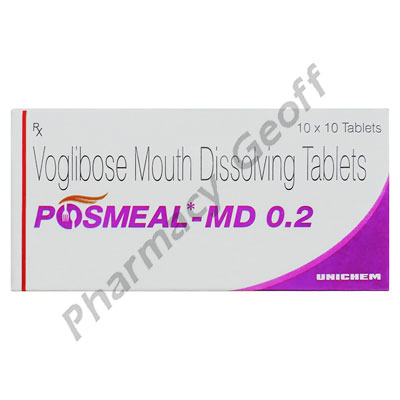| Brand Name: |
Posmeal MD |
| Generic Name: |
Voglibose |
| Form: |
Tablets |
| Manufacturer: |
Unichem |
What is Posmeal MD?
Posmeal MD (Voglibose) is a hypoglycemic medication, which is prescribed for type 2 diabetes treatment, when it is impossible to regulate the blood glucose levels by means of diets and/or physical exercise, as a single-medication therapy or in combination with other hypoglycemic medications or in combination with insulin; for type 1 diabetes, in combination with insulin; for type 2 diabetes prevention in patients with known glucose tolerance disorders.
How is Posmeal MD used?
Posmeal MD (Voglibose) is taken three times a day before every meal. The standard initial prescribed dose is 0.2mg, however it may be increased up to 0.3mg in case the initial dose proves to be insufficient to achieve the desired therapeutic effect. The increase in dose would require constant monitoring of the patient's condition.
Adverse effects
Posmeal MD (Voglibose), as any other medication, does not only treat the disease, but may also cause side effects. In case your physician fails to warn you about the potential side effects of the medication, the package insert contains the list of all possible adverse events that might be associated with the treatment.
Posmeal MD (Voglibose) may cause metabolic side effects, such as hypoglycemia; digestive side effects, such as abdominal distention, increased intestinal gas, diarrhea, intestinal obstruction; and hepato-biliary side effects, such as fulminant hepatitis, severe liver disorders, elevated liver transaminase, and jaundice.
Your physician can reduce the dose, change dose frequency or replace the medication. All these measures will reduce adverse events to a minimum. The medication is selected and the dose is prescribed by your physician, however the final decision, whether to take it or not, remains with the patient.
Warnings
Posmeal MD (Voglibose) should be used with caution under the following circumstances:
- Concurrent administration of other hypoglycemic medications (as it may lead to hypoglycemia);
- Laparotomy or intestinal obstruction in past medical history (as it may lead to the deterioration in the patient's condition due to increased intestinal gas);
- Chronic bowel diseases, accompanied by the digestion and absorption disorders (it may lead to the deterioration in the patient's condition due to the Voglibose mechanism of action);
- Roemheld syndrome (it may lead to the deterioration in the patient's condition due to increases intestinal gas);
- Colon hernia, stenosis, or ulcer (it may lead to the deterioration in the patient's condition due to increases intestinal gas);
- Severe liver dysfunction (it may lead to significant blood glucose fluctuations due to metabolic disorders);
- Liver cirrhosis (it may lead to further deterioration in the patient's condition due to hyperammonemia);
- Severe kidney dysfunction (it may lead to significant blood glucose fluctuations due to metabolic disorders).
|




